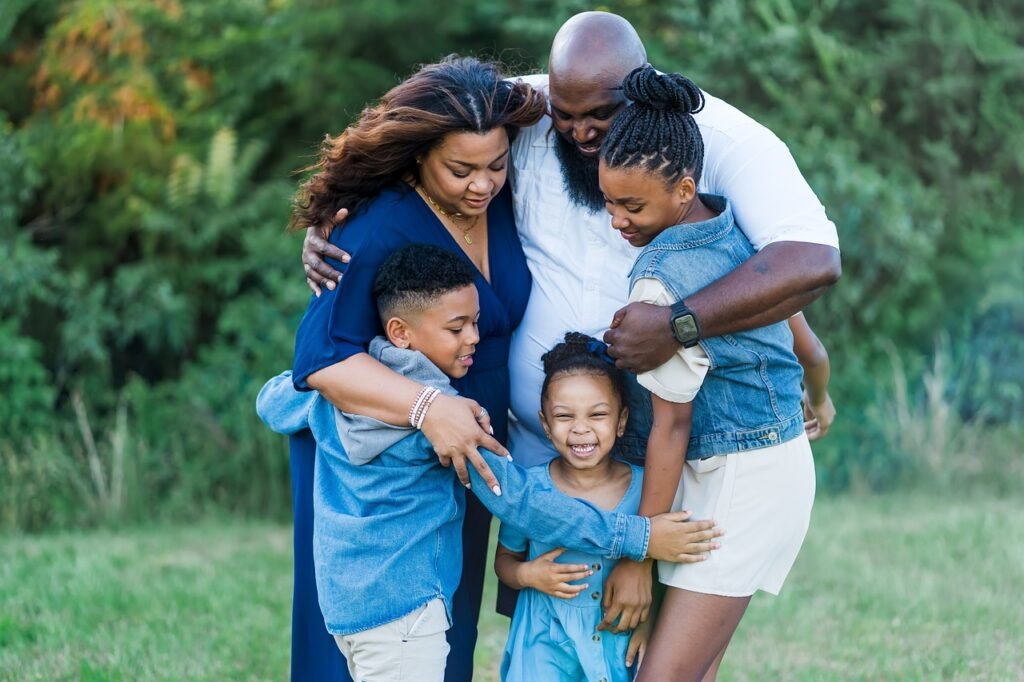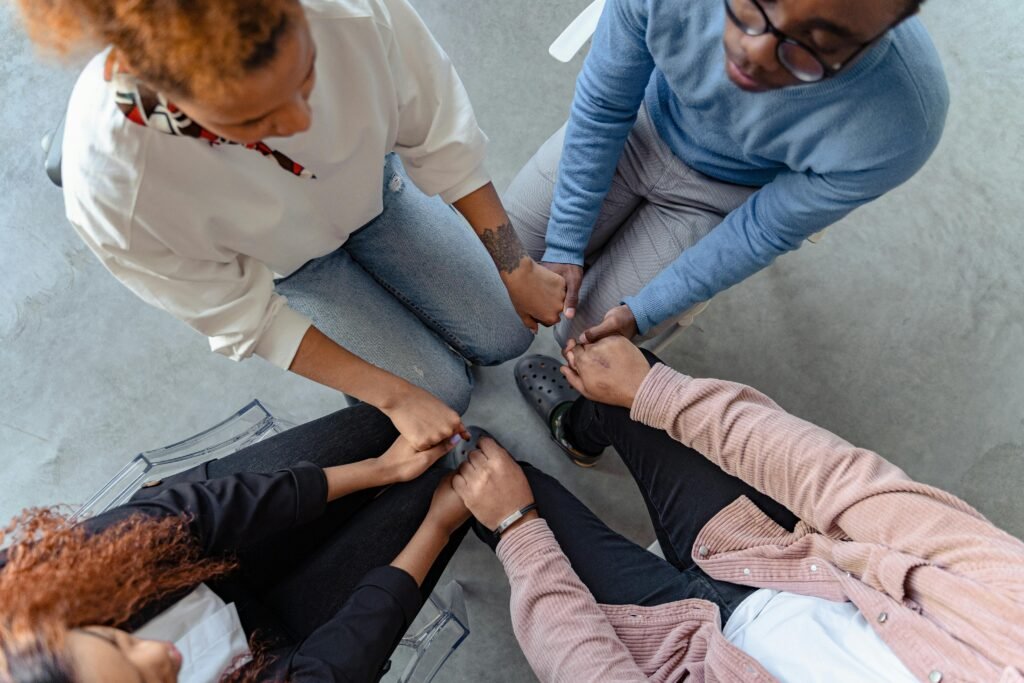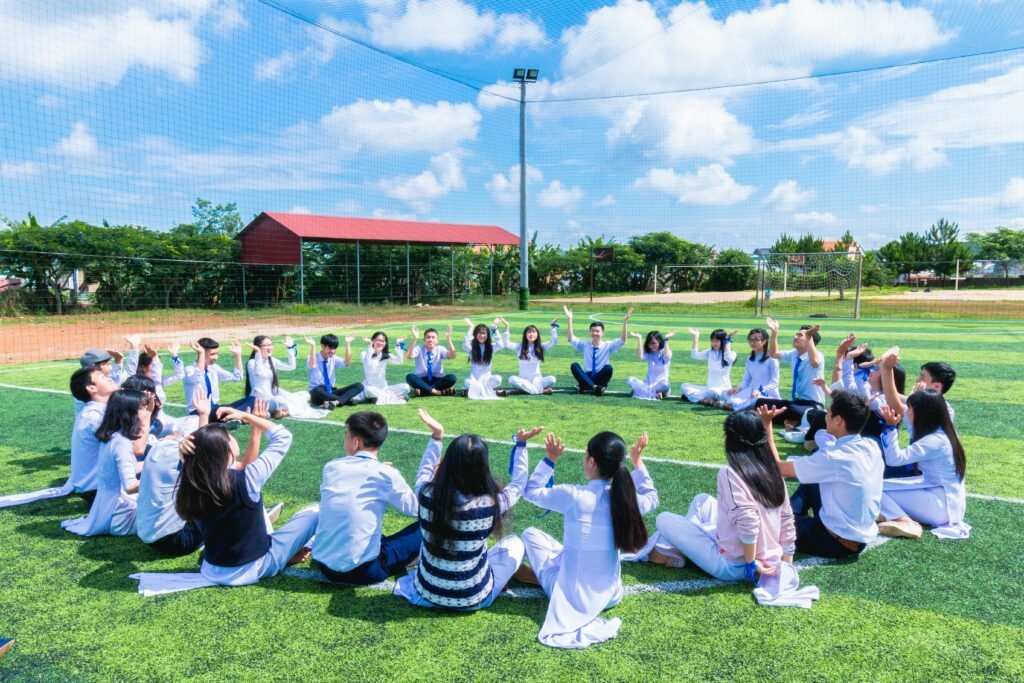
Grasping the Concept of Relationship Circles
Understanding relationship circles can significantly impact how we connect with others and grow personally.
Picture these circles as layers around you, with each representing different social relationships and varying levels of intimacy and significance.
By identifying how these circles intersect and function, you can navigate your relationships more smoothly.
In the center is the core circle, made up of those closest to you—people who play a vital role in your life.
These are the individuals you rely on and who influence your thoughts, emotions, and decisions most profoundly.
As you move outward, each subsequent circle includes people who are progressively less central to your daily life but still important.
Think of the next circle as your close friends.
These are the people you trust deeply, share your dreams and fears with, and who provide a crucial support system.
Beyond them lies the circle of casual friends and acquaintances.
These are people you enjoy spending time with and who contribute to your social life but aren’t as integral as your close friends.
Moving further out, you encounter your professional connections.
These relationships, while not deeply personal, are essential for career growth and professional fulfillment.
They include colleagues, mentors, and industry contacts who provide support, knowledge, and opportunities for advancement.
Further along, you have your broader social network, often facilitated by social media.
This circle includes people you interact with occasionally, such as old classmates or distant relatives.
These connections can offer a sense of community and belonging, even if they aren’t part of your daily life.
The outermost circle comprises community relationships.
These are the ties you form through local activities, volunteering, or shared interests.
Engaging with this circle helps foster a sense of social responsibility and connectedness to the broader world.
Recognizing the dynamics within these circles helps you understand the varying roles people play in your life and manage your time and emotional investment accordingly.
By thoughtfully engaging with each circle, you create a more balanced and fulfilling network of relationships.
The Family Sphere

Family forms the core of our relationship circles, often shaping the earliest and most enduring bonds we experience.
These relationships provide a fundamental sense of security, shared values, and a rich history of memories.
From childhood to adulthood, family members influence our worldview, character, and emotional well-being.
Navigating family dynamics can be complex.
Each member brings their own set of experiences, perspectives, and expectations, which can sometimes lead to conflicts or misunderstandings.
Open communication is essential in addressing these challenges.
Being transparent about your feelings and listening actively to others helps in fostering a harmonious environment.
Moreover, setting healthy boundaries is crucial.
While family ties are significant, it’s important to balance these relationships with your personal needs and growth.
Clearly defining your limits can help prevent burnout and maintain a healthy emotional state.
This includes understanding when to step back and when to engage fully with family matters.
Family traditions and rituals also play a pivotal role in strengthening these bonds.
Whether it’s holiday gatherings, weekly dinners, or annual vacations, these shared experiences create lasting memories and a sense of unity.
Participating in these activities can reinforce your connection and commitment to your family.
However, it’s equally important to recognize the individuality of each family member.
Respecting their personal space, choices, and identities fosters mutual respect and deeper understanding.
Celebrating each other’s achievements, no matter how small, can boost collective morale and strengthen the familial bond.
Financial and caregiving responsibilities often add another layer of complexity to family relationships.
Whether it’s supporting aging parents, raising children, or managing household finances, these tasks require collaboration and mutual support.
Sharing these responsibilities equitably ensures that no one feels overwhelmed or undervalued.
Family counseling or therapy can also be beneficial in navigating difficult times.
Professional guidance provides tools and strategies for improving communication, resolving conflicts, and building stronger relationships.
Seeking such support is a proactive step towards maintaining a healthy and resilient family unit.
In essence, family relationships are foundational yet require ongoing effort and attention.
By nurturing these bonds thoughtfully, you create a supportive and enriching environment for everyone involved.
The Friends Network

Friends form an essential circle in our lives, offering emotional support, companionship, and a sense of belonging.
With the rise of social media, keeping in touch with friends has become easier yet more complex.
To nurture these friendships, it’s vital to make a concerted effort to communicate regularly.
Regular communication doesn’t just mean sending a quick text; it involves meaningful conversations where you listen actively and share your thoughts and feelings.
Planning in-person meetups is another excellent way to strengthen these bonds.
Whether it’s grabbing a coffee, attending a concert, or going on a weekend getaway, face-to-face interactions create lasting memories and deepen your connection.
Being a reliable confidant is crucial.
Trust is the foundation of any strong friendship, and being there for your friends during their highs and lows solidifies that trust.
Be supportive, show empathy, and offer your honest advice when needed.
Your friends will appreciate your reliability and openness, further solidifying your bond.
Social media can be a double-edged sword in the friends network.
While it provides a convenient platform for staying connected, it can also lead to superficial interactions.
Strive to use social media as a tool to enhance your friendships rather than as a substitute for real, meaningful connections.
Share updates, celebrate milestones, and engage in thoughtful discussions online, but don’t let it replace the quality time you can spend together in person.
Another key aspect is mutual respect and understanding.
Every friendship involves give-and-take, and recognizing each other’s boundaries and personal space is essential.
Respecting your friends’ time, opinions, and choices fosters a healthy and balanced relationship.
Lastly, don’t underestimate the power of small gestures.
A handwritten note, a surprise visit, or even a simple compliment can go a long way in showing your friends that you value and appreciate them.
These seemingly minor acts can have a significant impact, making your friends feel cherished and understood.
The Professional Realm

Building and maintaining professional relationships is essential for career advancement and overall job satisfaction.
In the professional realm, these connections can provide mentorship, open doors to new opportunities, and create a supportive work environment.
Developing a strong professional network involves more than just exchanging business cards; it requires genuine engagement and mutual respect.
Start by actively participating in team projects and workplace events.
This shows your colleagues that you are committed and reliable.
Volunteering for new initiatives or leading projects can also highlight your skills and dedication, helping you to stand out in the workplace.
Remember to recognize and appreciate your colleagues’ efforts, as this fosters a culture of mutual respect and collaboration.
Effective communication is key.
This means not only sharing your own ideas and feedback but also listening to others.
Being approachable and open to dialogue makes you a valuable team member and can lead to deeper professional connections.
When discussing work matters, aim for clarity and transparency to avoid misunderstandings and build trust.
Mentorship plays a crucial role in the professional realm.
Whether you are a mentor or a mentee, these relationships offer valuable insights and guidance.
Seek out mentors who can provide advice based on their experiences, and don’t hesitate to mentor others when you have the expertise to share.
These interactions can be mutually beneficial, contributing to both parties’ growth and development.
Networking outside of your immediate workplace is equally important.
Attend industry conferences, workshops, and seminars to meet professionals from other organizations.
Engaging with a broader network can provide fresh perspectives and open up opportunities that might not be available within your current environment.
Leverage digital platforms like LinkedIn to maintain and expand your professional network.
While face-to-face interactions are invaluable, online connections can help you stay updated on industry trends and job openings.
Regularly update your profile, share relevant content, and participate in online discussions to keep your network active and engaged.
Lastly, always be willing to offer help and support to your professional contacts.
Whether it’s providing a recommendation, sharing useful resources, or offering your expertise, these gestures strengthen your network and build lasting professional relationships.
The Romantic Domain

Romantic relationships are unique as they blend elements of friendship, partnership, and emotional intimacy.
These connections often serve as a cornerstone in our lives, offering a profound sense of companionship and understanding.
A thriving romantic relationship requires a balance of mutual respect, communication, and shared experiences.
One of the key aspects of a healthy romantic relationship is open and honest communication.
This involves not just talking but also listening—really listening. When both partners feel heard and understood, it fosters a deeper emotional connection.
It’s important to express your needs and concerns clearly while also being receptive to your partner’s feelings and perspectives.
Shared experiences and quality time are also crucial.
Whether it’s a weekend getaway, a quiet dinner at home, or a simple walk in the park, spending time together helps to strengthen your bond.
These moments create lasting memories and deepen your emotional connection.
Physical intimacy, too, plays a significant role.
It’s not just about physical closeness but also the emotional intimacy that accompanies it.
Being affectionate and showing appreciation through small gestures can significantly enhance the emotional bond between partners.
Trust is another foundational element.
Building trust involves consistency, reliability, and honesty.
When trust is established, it creates a safe space for both partners to be vulnerable and authentic.
This, in turn, strengthens the relationship’s core.
Navigating conflicts constructively is equally important. Disagreements are inevitable, but how you handle them can make or break your relationship.
Aim to resolve conflicts with empathy and understanding, focusing on finding solutions rather than placing blame.
Healthy conflict resolution helps to grow together rather than apart.
Additionally, maintaining individuality within a relationship is vital.
While shared goals and interests are important, each partner should also have personal aspirations and hobbies.
Supporting each other’s individual growth can lead to a more fulfilling partnership, where both parties thrive not just as a couple but also as individuals.
In essence, nurturing a romantic relationship involves a delicate balance of emotional intimacy, mutual respect, and continuous effort.
By paying attention to these aspects, you can build a relationship that is both enriching and enduring.
The Social Media Influence

Social media has become a pervasive influence in our relationship circles, transforming how we interact and communicate.
While these platforms offer opportunities to connect with others, they also present challenges, such as maintaining authentic relationships and managing digital boundaries.
In the digital age, social media offers the convenience of staying connected with friends, family, and professional contacts from anywhere in the world.
Sharing life updates, celebrating milestones, and engaging in conversations can help maintain and even strengthen relationships.
However, the digital nature of these interactions can sometimes lead to superficial connections, where the depth and authenticity of face-to-face interactions are missing.
One significant challenge is the temptation to compare our lives to the curated highlights we see on social media.
This can lead to feelings of inadequacy or jealousy, which can strain relationships and impact mental well-being.
It’s essential to remember that social media often showcases only the best moments, not the full picture of anyone’s life.
Managing digital boundaries is crucial to maintaining healthy relationships.
This includes being mindful of the time spent online and ensuring it doesn’t encroach on real-world interactions.
Setting limits on social media usage and prioritizing face-to-face communication can help strike a balance between digital and personal connections.
Additionally, the anonymity and distance provided by social media can sometimes lead to misunderstandings or conflicts.
Tone and intent can be easily misinterpreted in text, leading to unnecessary disputes.
To mitigate this, strive for clarity and positivity in your online interactions and, when possible, address sensitive topics in person or through a direct conversation.
Ultimately, while social media is a powerful tool for maintaining and expanding relationship circles, it’s important to use it mindfully.
By being aware of its potential pitfalls and actively working to maintain genuine connections, you can harness its benefits without letting it detract from the quality of your relationships.
The Community Engagement

Being part of local communities enriches your relationship circles by adding a sense of shared purpose and belonging.
Participating in community activities like volunteering, attending local events, or supporting initiatives connects you with diverse groups of people, fostering new friendships and expanding your social horizons.
Volunteering is a fantastic way to contribute to your community while also gaining personal satisfaction.
Whether it’s helping at a local food bank, participating in a neighborhood cleanup, or mentoring youth, these activities not only benefit others but also enhance your sense of self-worth and accomplishment.
You’ll meet people who share your values and passions, creating bonds that might extend beyond the community project.
Attending local events, such as farmers’ markets, cultural festivals, or town hall meetings, provides a platform for engaging with your neighbors and learning about the issues and interests that shape your community.
These interactions help you build a network of acquaintances who can offer diverse perspectives and insights.
Supporting community initiatives, whether through donations, advocacy, or active participation, empowers you to play a role in the positive development of your surroundings.
This can range from backing local businesses to engaging in civic activities that address local issues.
By being an active participant, you help foster a stronger, more resilient community.
Additionally, joining clubs or groups that focus on specific interests—like gardening, book clubs, or fitness groups—provides structured opportunities to meet new people and share experiences.
These settings offer a more relaxed environment to form connections based on common interests and activities.
Engaging with your community broadens your relationship circles, introducing you to new people and experiences that can greatly enrich your life.
Personal Development and Relationship Circles

Each layer of your relationship circles plays a pivotal role in your personal development.
At the core, family shapes your foundational values and provides a sense of belonging, essential for emotional stability.
Friends enrich your life by offering diverse perspectives and emotional support, crucial for personal growth and resilience.
Your professional network, while distinct from personal relationships, drives career advancement and skill development.
These connections offer mentorship, open doors to new opportunities, and create a collaborative work environment, all of which are vital for your professional and personal growth.
Romantic relationships add another dimension, blending friendship, partnership, and emotional intimacy.
They teach you about compromise, trust, and deep emotional connection, which are essential life skills.
Balancing these relationships requires a keen sense of self-awareness and time management.
Prioritize relationships based on their impact on your life and allocate your time accordingly.
Practicing effective communication and setting boundaries ensures that each relationship remains healthy and fulfilling.
Engaging with your broader social and community circles introduces you to new experiences and perspectives, further enriching your personal growth journey.
Participating in community activities or joining interest-based groups can provide a sense of purpose and belonging, expanding your social horizons.
By thoughtfully managing your relationship circles, you create a supportive network that nurtures your overall well-being and continuous self-improvement.
